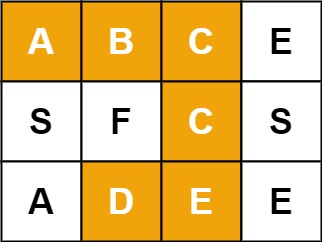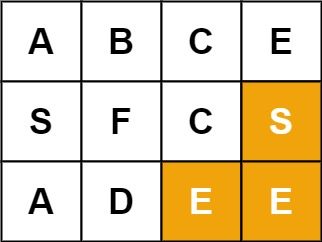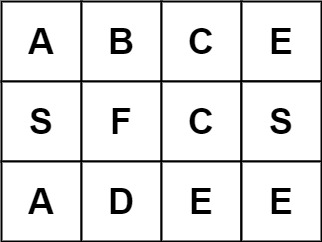Problem
Given an m x n grid of characters board and a string word, return true if word exists in the grid.
The word can be constructed from letters of sequentially adjacent cells, where adjacent cells are horizontally or vertically neighboring. The same letter cell may not be used more than once.
https://leetcode.com/problems/word-search/
Example 1:

Input:
board = [["A","B","C","E"],["S","F","C","S"],["A","D","E","E"]], word = "ABCCED"
Output:true
Example 2:

Input:
board = [["A","B","C","E"],["S","F","C","S"],["A","D","E","E"]], word = "SEE"
Output:true
Example 3:

Input:
board = [["A","B","C","E"],["S","F","C","S"],["A","D","E","E"]], word = "ABCB"
Output:false
Constraints:
m == board.lengthn = board[i].length1 <= m, n <= 61 <= word.length <= 15boardandwordconsists of only lowercase and uppercase English letters.
Follow up: Could you use search pruning to make your solution faster with a larger board?
Test Cases
1 | class Solution: |
1 | import pytest |
Thoughts
直接递归回溯。
从值等于 word[0] 的 cell 开始,看上下左右四个,对每个等于 word[1] 的 cell 递归处理。
为了避免同一个 cell 被使用多次,可以用一个集合记录当前用到的 cells 的坐标,递归的时候判定是否已经用过了。也可以临时把用到的 cell 的值设置为一个非法值(如空字符串),避免再次被匹配上,注意检查完要还原回去。
设 word 的长度为 w,时间复杂度为 O(m * n * 4ʷ),空间复杂度 O(w)(递归调用深度)。
Code
1 | class Solution: |
Follow up - Pruning
复杂度高在 4ʷ 这里,随着 word 长度的增加而指数级增大。
开始想着如果扫描过程中,知道某个 cell 无法串出 word[k:],下次在通过其他路径扫描到这个 cell 时,可以快速裁剪掉。不过似乎不可行,因为 word 中可能有重复出现的字符,前一次无法串出可能是因为当时的前半截把一些字符占用了,如果换一个起点是有可能成功的。
比如下图的 board,目标 word = "ABCDA"。
从 board[0][1] = 'A' 出发时,会发现 board[1][1] = 'B' 无法串出 word[1:] = "BCDA";但是如果从 board[1][0] = 'A' 出发却可以。
只有当 word[k:] 不包含 word[:k] 中任何字符时才可以应用此裁剪。
如果只是 board 大,似乎影响不大?w 不变的时候,时间是跟 m * n 成正比的。
TODO